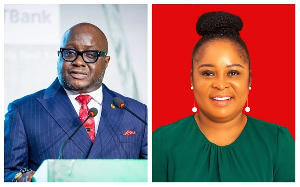Dr Eric Osei-Assibey, an Economist and Senior Lecturer at the University of Ghana, says government should find more pragmatic approach to solving graduate unemployment, instead of rolling out the “Nation Builders Corps” programme.
He said the 100,000 graduates government would employ under the programme would place enormous burden on government’s fiscal expenditure.
He said the programme was a brilliant idea but the approach government was using to address graduate unemployment would be problematic in the long term.
He therefore, urged government to expand the local economy and provide more incentives to the private sector to expand, in order to absorb the unemployed graduates.
Dr Osei-Assibey, who is also a Senior Research Fellow at the Institute of Economic Affairs (IEA), told the Ghana News Agency in Accra, on Thursday, in reaction to some initiatives government intended to roll out next year, as stated in the 2018 Budget and Economic Policy.
He said government does not provide direct jobs because places where government had provided jobs, it has not been sustainable, and particularly at a time when government wanted to rationalise or reduce public sector wages.
“We have seen government pioneered job creation programmes like the National Youth Employment Programme, GYEDA, YEA and others, which is trying to address youth unemployment and so this Nation Builders Corps may not provide productive jobs that graduates would need and it would also put too much strain on government’s expenditure,” he noted.
The Economist admonished government to take a critical look at the wage bill because three items take the chunk of the money, including interest payments on loans, statutory transfers paid to statutory bodies like the National Health Insurance Scheme, District Assemblies Common Fund, Ghana Education Trust Fund, Road Fund and others, which took one-third, whilst wages and salaries alone constituted 45 per cent.
“This makes government expenditures very rigid and fails to go into infrastructure development, but government keeps on rolling out more and more initiatives which will increase the compensation sum,” he observed.
Dr Osei-Assibey said government should look at innovative ways of generating enough revenue from within since budget support from outside or donors had dwindled considerably, therefore government should be more aggressive in domestic resource mobilisation.
He said the 2018 budget was good because it showed government’s commitment to transform the economy.
“If you look at the macroeconomic perspectives you can clearly see that the economy is picking up because inflation is on the downward trend, policy rate has stabilised and the fiscal deficit which in 2016 was around 9.3 per cent is now projected around 6. 3 per cent,” he noted.
Dr Osei-Assibey explained that the Gross Domestic Product (GDP) growth had gone higher than anticipated at 7. 8 per cent, which showed that the economy was on track.
“Government achieved 6.3 per cent fiscal deficit because government consistently cut down fiscal expenditure on the back of low revenue and that is a concern to me, because we cannot continuously cutting down our expenditures, since certain key projects or initiatives such as the Free Senior High School policy, Teacher Trainee Allowances, One District One Factory, and others, required money to execute and, therefore, it is not okay to cut down expenditures,” he explained.
He said the 2018 budget lacked the kind of force and momentum to generate sufficient revenue to roll out the various initiatives, therefore some good initiatives introduced in the budget may not be realised within the budget year.
“For instance, government wants to generate revenue by ensuring tax compliance but compliance required restructuring, changing people’s orientation towards paying taxes, strengthening existing institutions and these required a bit of time to bear fruits,” he noted.
He said government should find innovate means of expanding the tax net and not necessarily increasing taxes, saying; “Government should move forcefully to the informal sector and deploy technology to collect taxes and it could leverage on the mobile money platforms to collect taxes in the informal sector”.
For instance, in East African countries like Tanzania, Kenya and others, “this is how people use the mobile money system to pay taxes to the government”.
He urged government to pluck all the loopholes in the revenue collection system because some officials condoned with taxpayers to evade taxes.
Dr Osei-Assibey lauded government for introducing the paperless system at the country’s ports and expressed optimism that it would boost government’s revenue.
Government has projected to spend GH?62 billion to implement the 2018 budget.
Click to view details



Business News of Thursday, 16 November 2017
Source: GNA
'Nation Builders Corps' initiative will not solve graduate unemployment - Economist
Opinions
















